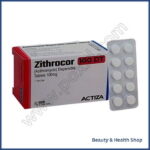ADDICTION
ALCOHOL DEPENDENCE
QUIT SMOKING
ALLERGY
ANTI FUNGAL
FUNGAL INFECTION
FUNGAL NAIL INFECTIONS
ANTI-REJECTION DRUGS
ANTI WORM
ANTIBIOTIC
BACTERIAL INFECTIONS
ARTHRITIS
GOUT
OSTEOARTHRITIS
RHEUMATOID ARTHRITIS
BLOOD
LOW PLATELET COUNT
THROMBOPHLEBITIS
VARICOSE VEINS
COLON
ANAL FISSURE
PILES
ULCERATIVE COLITIS
DIABETES CARE
DIABETES INSIPIDUS
DIABETES TYPE
DIABETIC FOOT ULCERS
GLUCOSE MONITOR
EYES/EAR CARE
DRY EYES
EYE CARE
EYE EXAMINATION
EYE INFECTION
EYE LASHES
EYE PAIN
GLAUCOMA
OCULAR HYPERTENSION
UVEITIS
FEVER CARE
MALARIA
RHEUMATIC FEVER
TYPHOID FEVER
GASTROINTESTINAL
ACIDITY
CONSTIPATION
CROHN'S DISEASE
DIARRHOEA
GALLBLADDER STONES
INTESTINAL ULCERS
IRRITABLE BOWEL SYNDROME
MOTION SICKNESS
NAUSEA
Azithromycin 100 mg
| Active Ingredient (Generic Name): | Azithromycin |
|---|---|
| Indication: | Bacterial Infections |
| Manufacturer: | Actiza Pharmaceutical Pvt. Ltd. |
| Packaging: | 10 tablets in one strip |
| Strength: | 100 mg |
From: $73.00
When considering Azithromycin 100 mg, you may wonder about its effectiveness in treating various infections. Understanding how this antibiotic specifically targets bacteria without harming human cells is essential. Exploring the nuances of its dosage, administration, and potential side effects can provide valuable insights into its role in combating infections. Discovering the specific conditions in which Azithromycin 100 mg is most beneficial can shed light on its significance in modern healthcare practices.
Why is this medication prescribed?
To understand why Azithromycin 100 mg is prescribed, consider its mechanism of action against bacterial infections. Azithromycin is an antibiotic that works by stopping the growth of bacteria. It does this by interfering with the protein synthesis process that bacteria need to multiply and spread. Specifically, Azithromycin binds to the bacterial ribosomes, which are essential for protein production, and prevents them from functioning properly. This disruption ultimately leads to the inhibition of bacterial replication, helping your body’s immune system to effectively fight off the infection.
Doctors prescribe Azithromycin 100 mg for various bacterial infections, such as respiratory tract infections, skin infections, ear infections, and sexually transmitted diseases. The specific dosage and duration of treatment depend on the type and severity of the infection. It’s important to follow your healthcare provider’s instructions carefully and complete the full course of medication, even if you start feeling better before it’s finished. Failure to do so may result in the infection not being fully cleared, leading to potential recurrence or antibiotic resistance.
How should this medicine be used?
For best results, take Azithromycin 100 mg exactly as prescribed by your healthcare provider. This medication is typically taken by mouth with or without food as directed by your doctor, usually once a day. It’s essential to follow the specific dosing instructions provided to you.
Swallow the tablets whole with a full glass of water. Don’t crush, chew, or break the tablets before swallowing. If you’re using the liquid form of this medication, shake the bottle well before each dose and carefully measure the dose using a special measuring device or spoon. Don’t use a household spoon as you may not get the correct dose.
Continue to take Azithromycin 100 mg until the full prescribed amount is finished, even if your symptoms improve before the medication is completed. Stopping the medication too early may allow the bacteria to continue to grow, which may result in a return of the infection. If you have any questions about the proper use of this medication, consult your healthcare provider for clarification.
Other uses for this medicine
If you have any doubts about the intended uses of Azithromycin 100 mg beyond its primary indication, consult your healthcare provider for guidance.
While Azithromycin is commonly prescribed to treat bacterial infections like respiratory tract infections, sinusitis, and skin infections, it may also have other potential uses. Some healthcare providers may prescribe Azithromycin for certain sexually transmitted infections like chlamydia or gonorrhea.
Additionally, in some cases, it might be used to prevent bacterial infections in individuals with a weakened immune system. Research is ongoing to explore its efficacy in treating other conditions, such as certain inflammatory diseases or as a prophylactic treatment for specific infections.
However, it’s important to follow your healthcare provider’s recommendations regarding the appropriate use of Azithromycin, as using antibiotics inappropriately can lead to antibiotic resistance and other adverse effects. Always adhere to the prescribed dosage and duration to ensure the best outcomes and minimize potential risks.
What special precautions should I follow?
When taking Azithromycin 100 mg, it’s important to check for potential drug interactions with other medications you’re currently using. Inform your healthcare provider about all the medicines, supplements, and herbal products you’re taking to avoid any adverse effects.
This precaution helps guarantee the safe and effective use of Azithromycin 100 mg for your specific medical condition.
Check for Drug Interactions
To ensure your safety and effectiveness of treatment, always inform your healthcare provider about any other medications or supplements you’re currently taking before starting Azithromycin 100 mg. This step is essential to avoid potential drug interactions that could impact the efficacy of Azithromycin or lead to adverse effects.
Here are some key points to keep in mind:
- Provide a detailed list of all prescription medications.
- Mention any over-the-counter drugs or supplements you’re using.
- Inform your healthcare provider about any allergies you have to medications.
What special dietary instructions should I follow?
Follow any dietary instructions provided by your healthcare provider while taking Azithromycin 100 mg. It’s generally recommended to take this medication on an empty stomach, at least 1 hour before or 2 hours after a meal. This helps optimize its absorption into your system, ensuring its effectiveness. However, if you experience stomach upset when taking Azithromycin, you may take it with food to minimize discomfort.
It is important to avoid consuming antacids that contain aluminum or magnesium within 2 hours of taking Azithromycin, as these can interfere with the absorption of the medication. Additionally, dairy products such as milk or yogurt should also be avoided around the time of taking Azithromycin, as they can reduce its effectiveness. Be sure to drink plenty of water while on this medication to stay hydrated and help your body process the medication efficiently. If you have any specific dietary concerns or restrictions, consult your healthcare provider for personalized advice.
What should I do if I forget a dose?
In case you miss a dose of Azithromycin 100 mg, take it as soon as you remember. However, if it’s almost time for your next dose, skip the missed dose and continue with your regular dosing schedule. Don’t double up on doses to make up for a missed one, as this can increase the risk of side effects.
To help you remember to take your medication, consider setting a daily alarm or placing the medication in a visible spot. It’s important to follow the prescribed dosing schedule to make sure the medication is effective in treating your condition.
If you frequently forget to take your doses, speak with your healthcare provider about potential solutions or tools that can help you adhere to your medication schedule. Open communication with your healthcare provider is vital in optimizing the effectiveness of your treatment with Azithromycin 100 mg.
What side effects can this medication cause?
When taking Azithromycin 100 mg, it’s important to be aware of the potential side effects. Some side effects can be serious, so monitor for any persistent symptoms.
If you experience any concerning symptoms, such as severe diarrhea, skin rash, or difficulty breathing, contact your doctor immediately for guidance.
Monitor for Persistent Symptoms
Be vigilant for any persisting symptoms that may arise as potential side effects of taking Azithromycin 100 mg. Some common side effects to monitor for include:
-
Upset Stomach: Nausea, vomiting, or diarrhea may occur but usually improve with time.
-
Skin Rash: Watch out for any unusual skin reactions like redness, itching, or peeling.
-
Headache or Dizziness: These symptoms can occasionally occur and should be monitored closely.
If you experience any of these side effects and they persist or worsen over time, it’s crucial to consult your healthcare provider for further guidance and evaluation. Remember to keep track of any symptoms you may encounter while taking Azithromycin 100 mg to prioritize your health and well-being.
Some side effects can be serious. If you experience any of the following symptoms, call your doctor immediately:
If you experience any of the following symptoms, contact your doctor immediately as certain side effects of Azithromycin 100 mg can be serious. Some side effects may include:
- Severe skin reactions such as blistering or peeling
- Irregular heartbeat or chest pain
- Persistent nausea or vomiting
These symptoms could indicate a severe reaction to the medication and require immediate medical attention.
It’s essential to be aware of these potential side effects and to seek help promptly if you experience any of them while taking Azithromycin 100 mg. Your health and well-being are of utmost importance, so don’t hesitate to reach out to your healthcare provider if you have any concerns.
What should I know about the storage and disposal of this medication?
Properly store and dispose of Azithromycin 100 mg as directed on the label to maintain its effectiveness and prevent misuse. Store this medication at room temperature away from light and moisture, unless otherwise instructed by your healthcare provider. Keep it out of reach of children and pets to avoid accidental ingestion. Don’t store Azithromycin in the bathroom or near the kitchen sink to prevent it from getting damp or exposed to heat.
When it comes to disposing of Azithromycin 100 mg, follow the specific guidelines provided by your pharmacist or local waste disposal company. Don’t flush this medication down the toilet unless instructed to do so. Instead, consider using a drug take-back program in your community if available. If such programs aren’t accessible, mix the medication with an unappealing substance like dirt, cat litter, or coffee grounds in a sealed plastic bag before throwing it in the trash. This helps prevent others from accidentally taking the medication. Remember to remove any personal information from the medication packaging before disposal.
In case of an emergency/overdose
In the event of an emergency or overdose involving Azithromycin 100 mg, promptly seek medical assistance or contact a poison control center. If you suspect an overdose or experience severe symptoms such as vomiting, diarrhea, or irregular heartbeats after taking Azithromycin 100 mg, don’t hesitate to seek help immediately. It’s important to provide healthcare providers with detailed information about the medication taken and the dosage consumed to guarantee appropriate treatment.
When contacting medical professionals or poison control, be prepared to share information such as the amount of Azithromycin 100 mg ingested, the time of ingestion, and any symptoms experienced. Follow their instructions carefully and don’t attempt to induce vomiting unless advised to do so by a healthcare provider. Emergency medical treatment may be necessary depending on the severity of the overdose and symptoms present.
What other information should I know?
When taking Azithromycin 100 mg, make sure to inform your healthcare provider about any other medications you’re currently using. It’s important to disclose all prescription drugs, over-the-counter medications, vitamins, and herbal supplements to prevent any potential interactions that could impact the effectiveness of Azithromycin or other medications.
Additionally, inform your healthcare provider about any medical conditions you may have, especially if you have a history of liver or kidney disease, heart rhythm disorders, myasthenia gravis, or any allergies to Azithromycin or other antibiotics. This information will help your healthcare provider make informed decisions about the suitability of Azithromycin 100 mg for your condition.
It is essential to follow your healthcare provider’s instructions regarding the dosage and duration of Azithromycin treatment. Don’t skip doses or stop the medication prematurely, even if you start feeling better. Completing the full course of treatment is necessary to make sure the infection is fully treated and to prevent the development of antibiotic resistance. If you have any questions or concerns about Azithromycin 100 mg, don’t hesitate to consult your healthcare provider for further guidance.
Brand names
After discussing important information to know when taking Azithromycin 100 mg, it is helpful to understand the brand names under which this medication is available. Azithromycin 100 mg is sold under various brand names depending on the pharmaceutical company manufacturing it. Below is a table listing some common brand names for Azithromycin 100 mg:
| Brand Name | Manufacturer |
|---|---|
| Zithromax | Pfizer |
| Azithrocin | Cipla |
| Azee | Torrent Pharma |
| Zady | Cadila Healthcare |
| Azilup | Lupin |
These brand names may vary depending on your location and the specific pharmacy you visit. It is vital to make sure you are purchasing Azithromycin 100 mg from a reputable source to guarantee its quality and effectiveness.
Purchase From Authorized Pharmacies
Make sure you purchase Azithromycin 100 mg only from authorized pharmacies to guarantee its authenticity and effectiveness. Authorized pharmacies are approved by regulatory bodies and adhere to stringent quality control measures, ensuring that the medication you receive is genuine and safe for consumption. When buying Azithromycin 100 mg, always check for the pharmacy’s license and accreditation to confirm its legitimacy.
Purchasing from authorized pharmacies also helps you avoid counterfeit or substandard products that may pose risks to your health. These pharmacies source their medications directly from reputable manufacturers, reducing the likelihood of receiving counterfeit or expired drugs. By choosing authorized pharmacies, you can have peace of mind knowing that you’re getting a high-quality product that meets safety standards.
Additionally, buying from authorized pharmacies allows you to access professional guidance from trained pharmacists. They can provide valuable information about the medication, including proper usage, potential side effects, and interactions with other drugs. This guidance ensures that you use Azithromycin 100 mg safely and effectively to treat your condition.
To summarise
For a concise overview, remember the significance of purchasing Azithromycin 100 mg from authorized pharmacies. When summarizing, it’s vital to highlight that Azithromycin 100 mg is an antibiotic used to treat various bacterial infections like respiratory infections, skin infections, and sexually transmitted diseases. This medication works by stopping the growth of bacteria. It’s essential to follow the prescribed dosage and complete the full course of treatment, even if you start feeling better. Missing doses or stopping the medication prematurely may lead to the infection not being fully treated and could contribute to antibiotic resistance.
Additionally, it’s important to be aware of potential side effects such as nausea, vomiting, diarrhea, and abdominal pain. If you experience severe side effects like severe diarrhea, irregular heartbeat, or allergic reactions, seek medical attention immediately. Remember to inform your healthcare provider about any other medications you’re taking to avoid potential drug interactions. Always consult a healthcare professional before starting any new medication, including Azithromycin 100 mg.








There are no reviews yet.